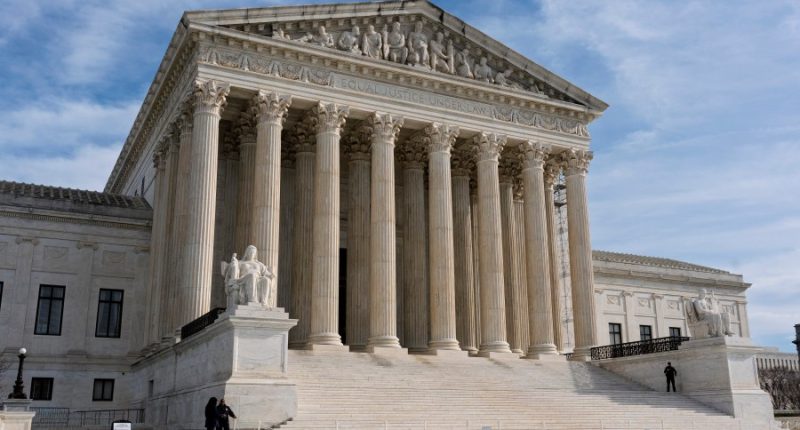Share this @internewscast.com

WASHINGTON () The U.S. Supreme Court has granted President Donald Trump’s request to temporarily halt nationwide injunctions from district courts on birthright citizenship.
The 6-3 ruling found that universal injunctions “likely exceed the equitable authority that Congress has granted to federal courts.“
The Supreme Court did not decide on whether Trump’s executive order to restrict birthright citizenship is constitutional.
Instead, it instructed district courts to “move expeditiously to ensure that, with respect to each plaintiff, the injunctions comport with this rule and otherwise comply with principles of equity.”
Justice Amy Coney Barrett authored the majority opinion, writing: “When a court concludes that the executive branch has acted unlawfully, the answer is not for the court to exceed its power, too.”
All three liberal justices dissented.
In her dissent, Justice Sonia Sotomayor warned of the precedent established in Friday’s decision.
“No right is safe in the new legal regime the Court creates. Today, the threat is to birthright citizenship,” Sotomayor wrote. “Tomorrow, a different administration may try to seize firearms from law-abiding citizens or prevent people of certain faiths from gathering to worship.”
Trump says birthright citizenship ruling ‘common sense’
An executive order from Trump in January would affect thousands of babies born each year in the United States. Federal judges in Maryland, Washington and Massachusetts originally blocked the order, finding it likely violates the Constitution’s 14th Amendment citizenship language.
Minutes after Friday’s decision, Trump posted on Truth Social about what he called a “giant win.”
He then held a news conference alongside U.S. Attorney General Pam Bondi and deputy AG Todd Blanche.
“This is a decision that covers a tremendous amount of territory. But I want to just thank, again, the Supreme Court for this ruling. It’s a giant,” Trump told reporters, describing the decision as one made by “common sense.”
Bondi called nationwide injunctions a “bipartisan problem that has lasted five presidential terms.”
“Birthright citizenship will be decided in October. Most likely that will be decided in October in the next session,” Bondi added.
The history of birthright citizenship in the US
That exception has traditionally been interpreted to exclude foreign diplomats’ children, foreign enemies in hostile occupation or Native American children subject to tribal laws. But some say the children of noncitizens fall under that umbrella, too.
The 14th Amendment reads: “All persons born or naturalized in the United States and subject to the jurisdiction thereof are citizens of the United States and of the state wherein they reside.” It didn’t, however, always apply to everyone. It wasn’t until 1924, for example, that Congress granted citizenship to all Native Americans born in the U.S.
Proponents of Trump’s plan zeroed in on the qualification that narrows birthright citizenship to children born in the U.S. who are “subject to the jurisdiction thereof.”
The justices heard arguments in the Trump administration’s emergency appeals over lower court orders that kept the citizenship restrictions on hold across the country.
Birthright citizenship is among several issues, many related to immigration, that the administration had asked the court to address on an emergency basis.
During arguments, the court’s liberal justices seemed firmly in support of the lower court rulings that found the changes to citizenship that Trump wants to make would upset the settled understanding of birthright citizenship that has existed for more than 125 years.
What has Trump said about birthright citizenship?
Trump has said for years that he wants to end birthright citizenship.
“It’s ridiculous. We are the only country in the world that does this with the birthright, as you know, and it’s just absolutely ridiculous,” he said in January. Dozens of countries, mostly in the Americas, have birthright citizenship.
Opponents say the practice encourages people to come to the U.S. illegally so their children can have citizenship. Others argue that ending birthright citizenship would profoundly damage the country.
In 2019, the Migration Policy Institute estimated that 5.5 million children under age 18 lived with at least one parent in the country illegally in 2019, representing 7% of the U.S. child population. The vast majority of those children were U.S. citizens.











